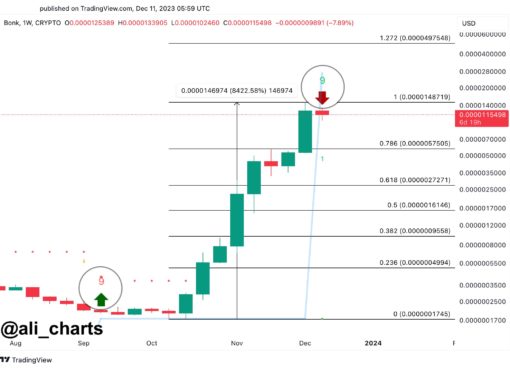The number of developers in crypto is ticking up again, according to the annual developer report from venture firm Electric Capital.
And one network remains a clear winner in terms of attractiveness to coders. “More than 300 new developers per month are joining Ethereum,” Maria Shen, a partner at Electric and the report’s author, told CryptoX. “Ethereum has continuously grown through Crypto Winter.”
The report tracks ecosystems by blockchain. In other words, a Bitcoin developer is counted toward Bitcoin even if the person is working on its Lightning Network or any of its wallets. Similarly, Ethereum’s numbers are driven by developers working on tokens that rely, fundamentally, on Vitalik’s world computer.
Of the ecosystem, Electric’s report shows Ethereum so far out in front that second place is almost misleading. Almost 2,300 average monthly developers worked on Ethereum across the third quarter of 2020, with Bitcoin in second at a bit under 400.
Still, the good news for the industry is broader: Developer numbers are going up across crypto’s stronger projects.
Electric’s data is based on ongoing scraping of all the publicly available code documentation (89 million code commits across just under 300,000 repositories on sites such as GitHub and GitLab from January to October). No one can know who is a paid staffer, who is a volunteer and who is trying to earn street cred that will get him or her a spot as a paid staffer. For that reason, the report also takes pains to segment contributors out by their rate of contribution.
All that said, when viewed across the board most people believe looking at developer activity in aggregate can be a good sign of health for any open-source technology project, crypto or otherwise.
“New monthly crypto developers grew 15% in 2020,” Shen writes in the report’s summary, noting also that the “Bitcoin ecosystem has 70% more developers than it did three years ago.”
Electric takes pains to track contributions, developers and to remove double counts as much as possible. For more detail on their methods, check out the report.
Also-rans
The report drew a line between the top 200 crypto projects by value and the rest, noting that much of the loss in developer activity occurred in the smaller projects, offsetting much of the gains elsewhere. Electric called this a flight to quality.
Ethereum, Bitcoin, Polkadot, Tezos, Cardano and EOS are the largest networks, each averaging more than 100 monthly developers. Of those, only EOS lost developers when the third quarter of 2020 is compared to 2019.
While many might think that making a distinction between the top 200 and the rest is still a too-generous threshold, Shen said there are likely some very small networks now that will rise up soon. Longtime denizens of the lower echelons of the top 200 are less likely to ascend but there could be some new arrivals that surprise everyone, and that’s why Electric drew the distinction so generously.
DeFi
The most striking area of growth has been in decentralized finance (DeFi), which has been a major topic in 2020.
No one can know for sure why new people are coming in, but Electric’s team had some guesses. Shen noted the tooling is better than it has ever been and there’s so much proven code to fork and build upon. That makes it easier to get started.
Electric co-founder Curtis Spencer noted that we’re now in an era where a developer can deploy a smart contract and very rapidly see an enormous amount of assets move into it. Even if they give control of that application away through a fair launch, as has become popular this year, that can still just be tremendously gratifying to someone who just wants to build.
Shen concurred that the engagement alone can be rewarding. “Once you launch a protocol, suddenly tens of millions of dollars are wrapped in your protocol,” she said.
For users of DeFi, though, sometimes this eagerness to see people use projects has come at a cost. Depositor beware.
Getting started
But some of the new activity also, no doubt, comes down to the fact that crypto is a space so well resourced that it’s fairly easy, for technical adepts, to get a new company started.
“We’ve seen a professionalization of grant funds,” Spencer added. This means that well-resourced layer one projects are eager to support promising devs with ideas for applications that might entice users. That makes it easier to get a company off the ground.
It should be noted that a grant kicked off Uniswap, now one of the biggest projects out there, in terms of funds entrusted to it.
Read more: Hayden Adams: King of the DeFi Degens
Ken Deeter, another Electric Capital partner, said the growth in DeFi might also be partially attributed to developers from fintech frustrated by what they can’t do there.
“DeFi is a really interesting area … where there’s an ability for developers to really experiment in a way that in the traditional financial system is difficult to do,” Deeter said.
In last year’s report, Electric explained that testnets were always moments that saw strong growth in developer activity, led by developments on the Cosmos network. Shen said that has continued to hold true, noting that NEAR had a strong showing this year.
Though the spikes fall after the incentives run out, she said they still see gains in ongoing participation following these booms.
The prior report also heavily emphasized the total number of commits in 2019 hadn’t fallen, though the number of developers had. There’s no update on commit volume this time around, however.
“We chose not to include it in this report,” Shen said, because some commits are so much less significant than others.




